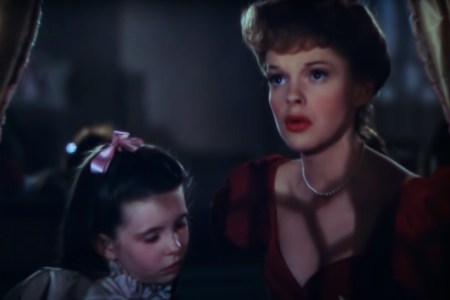30 Rock isn’t generally thought of as the quintessential Gen X show, probably because it launched during the ‘00s instead of the ‘90s, as contemporaries of 36-year-old showrunner Tina Fey were aging out of the zeitgeist and into full-blown adulthood. But the clues are all there in her onscreen alter-ego, permanently frazzled TV writer Liz Lemon: her first-gen Star Wars fandom, her girlhood Pete Rose idolatry, her time at college spent listening to the Indigo Girls and protesting apartheid like a good center-left liberal. She’s caught between the promises of second-wave feminism and its sobering lack of rewards, reconciling her passion for a thankless job that may be stealing her best years with her skepticism toward the conventional marriage she can’t help wanting. And there’s no setting better suited to this conflicted standing than the wondrous world of television, a unifying national art form described not inaccurately as “skits mocking our President to fill time between car commercials.” Every broadcast that brings the country Friday night live from New York inevitably turns into a mini-catastrophe which Liz still wouldn’t trade for anything. Elder scribe Rosemary Howard, Liz’s mentor and ghost of loneliness future (played by none other than Princess Leia herself), knows how it is. “Live TV is like sex,” she says. “It’s almost better when everything goes horribly wrong!”
This trademark balance between sentimentality and cynicism, harmonized by a willed affection for dysfunction, manifests in microcosm through the show’s take on the sitcom-staple Christmas episode. As anti-commercial Yuletide agnostics, X-ers were the first generation to normalize dreading time spent with relatives, steering the holiday through a fraught period between the Boomers’ roasted-chestnut nostalgia and Millennials’ breakaway into “Friendsmas” gatherings with chosen surrogate family units. In keeping with that spirit, most 30 Rock Christmases err on the side of naughty over nice, cataloguing character faults with the same unsparing fairness as St. Nick compiling his twice-checked list. Liz volunteers for a Letters to Santa program and buys a Black family’s presents, only to shatter the little ones’ belief when her white savior complex compels her to go to their home and take credit. The writing staff’s annual “Ludachristmas” blowout is preempted by an all-night sermon from pious page Kenneth, the gang’s eventual revelation about generosity and peace on Earth cross-cut with footage of African children destroying the useless photo scanners they’ve been given by the General Electric corporation.
That episode also introduces the through-line that links the handful of half-hours within this seasonal theme and massages a deeper, tenderer emotional undercurrent into the comic default of irony-laced ambivalence. In the A-plot, Liz’s salt-of-the-earth parents Dick and Margaret Lemon (multi-hyphenate great Buck Henry and stage legend Anita Gillette, one of the many Broadway babies filling out the guest cast and nodding to a sector of the entertainment industry that still values women over 40) drop by for a visit, and they’re not the only ones — also in New York is Colleen, mother to the other series protagonist, NBC executive Jack Donaghy. Her regular appearances each December chart a dynamic that changes while stubbornly refusing to evolve, as a son growing into the newfound sensitivities of marriage and fatherhood struggles to love a difficult mother who only becomes more and more herself with age. What do you get the woman who wants nothing?
An “Olympic-level racist” purportedly born wearing a hat, portrayed with a grande dame growl by the incomparable Elaine Stritch, Colleen Donaghy raised Jack as a single mother on the poverty line in the outer-Boston borough of Sadchester. The brutish, inhumane culture endemic to Massachusetts combined with her own hardscrabble lot in life to toughen her maternal side into a push-from-the-nest mentality she bequeaths to her son as a gift and curse. Her ceaseless criticisms and casual cruelty easily translate to outsized comedy: we learn that she once told a young Jack that JFK died because he talked in church, that making captain on the swim team would be a “great way to meet guys,” and that the scholarship he won upon graduating high school “should have gone to the other boy.” On some level, she really does seem to believe that her unflagging discouragement is her son’s secret to success, his mollycoddled peers letting their self-esteem content them with mediocrity. Sometimes, he worries that this might be true.
Like most people who move from their hometown to New York, he does so in pursuit of a preferable version of himself; when Liz mentions that she always forgets that he grew up poor, working the day shift at a graveyard and the graveyard shift at a Day’s Inn to pay his way through business school, he says “thank you.” Self-made, insightful and hard-working, he embodies the few positive qualities one could feasibly associate with a C-suite one-percenter, in essence a Democrat’s idealized notion of a Republican held together by the natural alpha-male screen presence of Alec Baldwin. (The two episodes in which his principles move him to take a Never Trump stand avant la lettre against the influence of a wacko party outsider deserve their own essay.) His image is as commanding and meticulously constructed as Don Draper’s, and like the farm boy born Dick Whitman, he falls apart whenever someone from his past rears their head to remind him of the small, timid kid he’s tried to leave behind.
And so Christmas arrives each year with a queasy lurch for Jack, shaking loose the neuroses and anxieties and compulsive stress-eating that lay dormant so long as his mother inhabits a city past state lines. Regular services at Our Lady of Reluctant Integration have left him with too much Catholic guilt to cut her out of his circle, and so he starts each check-in fresh with an effort to let her pointed comments roll off his shoulders. But, as he warns, “I once saw Colleen provoke a Buddhist monk into whipping a battery at her.” With one loaded remark, the most innocuous conversation can turn on a dime into a shouting match informed by decades of ossified resentment. This is how Colleen likes it, their energizing animosity separating them from the happy fuckin’ wanderers she sees as unsophisticated, unintelligent and weak. Maladjusted people are driven, and driven people make the world go. They don’t get trapped in a small home with five children they can’t afford. “I may be heavy furniture, but I did a pretty good job raising you,” she tells Jack. “I mean, look at you today and look at them.”
In “Ludachristmas,” she says this in response to her son’s insistence that the Lemon family knows how to be nice, a nurturing vibe he’s glommed on to while avoiding his own mother. Put off by their chirpy optimism and convinced it’s a sham of self-denial, Colleen resolves to break them and expose the hotbed of unrest she considers part and parcel to the familial unit. Over dinner at family-style chain Saturdaze, she finds the right stopper to pull on — Liz’s parents skipped her gender-barrier-smashing football game out of embarrassment — and all the bile comes pouring out. As they bellow confessions of regret and hostility at one another, Jack and Colleen take hands, visibly relieved to find that they’re not so different from anyone else. Under the show’s compromised concept of fulfillment, the warming glow of shared schadenfreude can pass for affection.
This doesn’t keep Jack from perennially renewing his misplaced sense of hope that this time around, he’ll figure out a path toward peaceable coexistence with his mother’s chronic dissatisfaction. In the following season’s “Christmas Special,” he tries to get the drop on her by surprising her in Florida, lavishing her with gifts (all of which she deems “adequate”), and then spending the 25th on vacation. On his way out, however, he accidentally — he hopes — backs into her with his car. Upon returning to New York with an ailing Colleen in tow, he spirals into a mini-breakdown that he attempts to assuage by forcing Liz’s staff to put on a “TV special in the tradition of Andy Williams” right out of his escapist sugarplum dreams. Wracked with remorse at the mere thought that he’s subconsciously trying to hurt someone he’s supposed to care for, he retreats into the wholesome haven of television, where a picture-perfect night is as simple as turning on the snow machine.
Just as it looks like repressing his bitterness toward his mother will kill either him or her, a conversation with Liz gives him a flash of perspective. He’s always remembered Colleen getting handsy with a male guest and turning Christmas Eve into a “boozy burlesque travesty,” and once nudged toward the epiphany that this man was F.A.O. Schwartz, he realizes that his mother traded sex for the toys she couldn’t buy herself. Liz asks whether they had a lot to open on Christmas morning despite being strapped, and his voice cracks as he whimpers with disarmed sympathy, “You couldn’t even see the tree.” It takes him nearly 50 years of arrested development to get there, but he experiences his first taste of real adulthood in the sudden, overwhelming awareness that parents make sacrifices and demonstrate dedication in ways we cannot understand until later in life — at which point we can only hope it’s not too late.
TV is static by nature and sitcoms doubly so, each week’s progress reverting to the same set of comic premises with the following episode. In the case of Jack and Colleen, this presents as a frustrated futility, every apparent breakthrough on his part doing nothing to change the cranky creature she will forever be. His resolve to see his mother through kinder eyes is tested in season five’s “Christmas Attack Zone” (now unavailable to stream due to a scene in which one character dons blackface for a costume as former Pittsburgh Steelers wide receiver Lynn Swann), Jack’s first Christmas with the biological father hidden by Colleen and located through a Mamma Mia!-type ruse. He’s brought Milton Greene in to shame her with his scandalous presence, retaliation for her disapproval of Jack’s paramour and out-of-wedlock baby mama Avery. Springing Milton on her almost works, until she regains the upper hand by faking a heart attack. From her hospital bed, she and Milton form a united front in chewing out Jack for his manipulations and disrespect; in another one of this show’s qualified expressions of having it all, Jack just chooses to smile at the sight of his parents standing together and getting along.
The 35 Saddest Christmas Songs
The holidays are going to be rough this year. Lean into it with these devastatingly great odes to being blue on Christmas.In her advanced age, Colleen becomes increasingly obsessed with what she believes is her impending death, a subject that hangs like Damocles’ sword over her final guest spot in the farewell season’s “My Whole Life Is Thunder.” Jack’s latest tactic is total detachment, doing nothing in a ploy to deprive his mother of ammo against him, a last resort of numbed indifference. She gets his attention with her claims that the end is near, and demands he take her to the hospital on a horse-drawn carriage ride through Central Park, down a road I traveled with my own mother (albeit in one of the manpowered rickshaws) a few years ago. Uncharacteristically softened in her parting moments, she tells Jack, “I just want you to be happy.” And with one more barb from him about putting her in a home, she’s gone. A year and a half after that episode’s broadcast, Stritch would be, too.
Though he sent his mother out with a threat, however hollow, Jack’s more hung up on her final words than his. He takes this wish of goodwill as mockery, haunted by her suggestion that he’s one of the middling smiley-faced people she’s always looked down on. He’s never been able to square her merciless treatment with her stated stance of love for her son, and only in her absence can he start to build a more forgiving memory of her. He accepts her words as if in surrender, but he gets the final word with a eulogy that reverently frames her as a resilient daughter of Irish immigrants and an unflappable, self-sufficient survivor of the 20th century. And because this is 30 Rock, he gets to sneak in one last jab by allowing a pair of sexual deviants to use her funeral as an occasion for their gimp-officiated surprise wedding, knowing she would hate it. Without completely relinquishing the hurt amassed over a lifetime, the TV exec recasts his mother in a role that tests better with his heart, even if it means overwriting the truth.
“All God’s children are terrible” is the closest 30 Rock gets to a mission statement, uttered by Liz at a stand-up showcase in rural Georgia where the ostensibly pure, friendly folks of the South turn out to be every bit as nasty as city slickers. In the show’s grey-hued weltanschauung, the human organism can be petty, selfish, lazy, vindictive or spiteful, and yet we’re also imbued with the flaws of our creator, imperfect creatures trying to live decently in an absurd moral obstacle course. So at least with family, one tries to be patient, to forgive, to remember that everyone’s muscling through interior dramas the rest of us know nothing about. With every Christmas, the good intentions behind this compassion are pitted against the difficulty of putting it into practice, nagging us with the gap between who we want to be and who we are. We do indeed love our loved ones, often despite their best efforts, and sometimes because we have no other choice. But until time makes the child the sole custodian of their parents’ legacy, the only recourse is to cherish the arguments you have, for as long as you can have them.
This article was featured in the InsideHook newsletter. Sign up now.






















